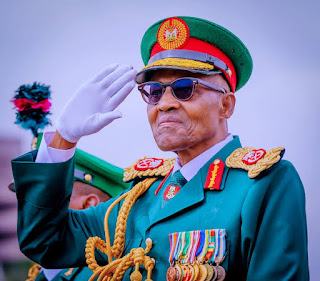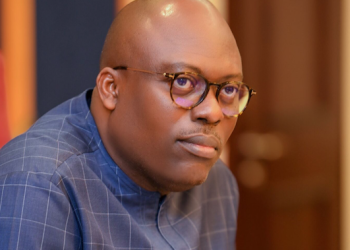We have never had a leader like Muhammadu Buhari, and we may never have one like him again. He first stepped into the nation’s imagination as a soldier and exited as a soldier in some eyes and a soldier-statesman in some other eyes, as a bigot in some others. Some will continue to see him, though, as a man of mystery.
Peter Enahoro, known as Peter Pan, and author of How To Be A Nigerian gave the first hint of his profile as a man of mystery when he interviewed him for his Africa Now magazine. He described him as “deceptively gentle.” Since Peter Pan’s characterization in the 1980’s, in his first time as leader, Buhari changed his image as a sublime chameleon in many ways.
He was a military leader, civilian bureaucrat, fighter for democracy as revenge rather than as ideologue, a presidential candidate as a supposedly repented autocrat, a serial loser with a Lincolnian strain, a president who developed a cult and fanatical following who bowed on the street and drank unclean water in his name, a president who almost died in office but developed a health status that resembled a miracle before he bowed out.
As a young man, my first introduction to the Katsina patriarch was when he was the General Officer Commanding (GOC) in Jos, and he asked the army to begin reading the Constitution to know their responsibility for the country.
As a columnist for the Nigerian Tribune, Ebenezer Babatope warned Nigerians to look out for the man, hinting that he was not a man to take for granted.
It was during the Shagari era, and Babatope warned that no one should be surprised if we woke up one morning and he would be behind the “good morning fellow Nigerians” accompanying a martial music.
It happened, according to his prophetic clairvoyance, in December 1983, and Buhari, later that night, in a winsome face and beret, addressed the country as a military ruler. He cherished that number 1983.
In 2006, when I placed a call to him for an interview, I used a colleague’s number. When we met at his suite at the Hilton, the first remark was whether I was the fellow whose number ended with 1983.
He beamed from ear to ear with a touch of rare vanity. I said no to his disappointment. He might have wanted to swap numbers.
When I met him that morning, I mused on a lot of things about the man. He had not had his second time as leader. I had a belief in him that he had the discipline and aura to run Nigeria.
As I had characterised him on this page and before I started writing for this newspaper, he would bring his spartan discipline to stanch the bleeding in the country. This was because as a military head of state he was a personage who loathed corruption, and wanted to bring the nation on the path of sanity.
So, when he ran for president, even the first time, I thought he was good for politics. The problem with Nigeria was not only a lack of discipline, but a lack of imagination in governance.
I thought Buhari would bring his spartan charm and blend it with men of thinking and energy on the front row while he ran the country as a czar of corruption and due process.
And that was the anticlimax of having him at the helm. He would govern with a purifying shadow, a sort of secular priest with his aura both cheering and chastening.
He became a president and ran it with a cabal of antediluvian ideas. With a man like Malami as attorney general espousing the idea of an old route grazing.
He presided over a sometimes cranky and conservative government, dead of ideas.
On the economy, he stood guard over a government that had no way to generate money except by printing and borrowing from China, among others. He gave us a debt of over N30 trillion in Ways and Means and several billions of dollars.
He left the finances in chaos and the nation’s morale was at the nadir. In one word, Buhari should have saved the economy from the Jonathan era where the nation was in dire straits. Rather, he worsened the situation, and created an economy that had to be saved from itself.
Buhari, in the end, turned out to be a man who looked after one man: Muhammadu Buhari. Nothing reflected this self-absorption more than when he was running for election. When in Ogun and Imo states, he asked voters to vote for him but vote their conscience on the governorship and other offices.
He dithered on his successor. He told the world he was not interested but he tried to undercut the best man in his whole political career: Bola Tinubu.
It was he who crafted an alliance that vaulted him to Aso Villa. Yet, he did not want him to succeed him. It was hypocritical that he did not even tell now President Tinubu that he did not want him as his successor.
Rather he put his weight behind former Senate president Ahmad Lawan.
It reflected his lack of integrity, and even blatant hypocrisy as a leader.
He did not only support Lawan, he ran an election-period economy with currency and fuel scarcity that cast his APC in bad light and sought to undermine its candidate.
In spite of accusations, he was unfazed and many saw those measures as choreographed to derail Tinubu’s presidential dreams.
So besieged was he that he did the wrong thing by showing off his voter’s card as a mark of party loyalty.
As military leader, he squeezed the economy in the name of enshrining a moral tone.
In his time as civilian leader, he choked the economy and failed as a moral compass. He might have made the claim that he was a moral leader in his first time with his war against indiscipline.
In retrospect, it was discipline without imagination or conscience. It was the same lack of imagination that throttled his way as a civilian president.
It has turned out that Buhari loved himself too much to love Nigeria enough. He loved his faith too much to open his heart out of his prejudices.
He visited Ibadan once as a fighter for the herdsmen, and it cast him as a bigot. He did not make much effort to defrock himself of such optics in the way he handled the herder crisis.
In fact, the link between the herder crisis and the banditry became more potent in his time, and was soft on banditry. The bandits swaggered in the bushes and highways, and had full eight years to fatten and nurture the monsters in their souls.
There is a belief that he did not want the bandits to be killed, so our murderers blossomed on the blood and treasures of society.
When I was a student at Ife, I expected much from the man when he took over as military leader. It was on the cusp of a new year he took over as head of state, December 31, 1983. There was a parade on campus hailing the end of democracy.
My throat joyed with songs that morning. When the French revolution was born, William Wordsworth crooned, “Bliss it was that dawn to be alive. But to be young was very heaven.” As a youth, I felt like that. Just as the revolution became a bust, Buhari’s coming with Decrees two and four hammered Nigerians out of our comforts.
When he wanted to be a civilian leader, I gave him a chance as a man of conscience. He failed. Buhari was a tease. He promised with an air of pious devotion. He did not deliver.
Yet, he had a charisma and cult following unmatched by any in our history. His was a charisma of suggestion. He was no demagogue, no performer.
If one, his was a demagogue of body language: his ramrod carriage, his no-smile and smile, his soldierly bearing, his façade of severity and disdain for materialism. If no doer, he bequeaths an example of beguiling simplicity. He was known for no extravagance, cars, houses, money show. His was an extravagance of apparent austerity.
He was loved by both cow and man. He did less for man than cow, but cows never had a way of gratitude known to man, except men like him, perhaps.
He was a head of herders without herding. He was a soldier but did not quaff or indulge the pleasures of the flesh.
He was a good soldier but preferred the love of his civilian followers. Danjuma once said he would want him as a chief of army staff rather than head of defence staff. He looked a force of character but he could not translate it to those he governed.
His following knew he could do no wrong. He might have lost some of his mystique to his failures, but if he ran for election again today in a coalition that guaranteed just a few millions from the south, no one can bet against him.
He is a testament to the futility of the crowd as a picture of wisdom. That is why we should be wary of man who, without clear vision, capture the imagination of the throng, a thing Elias Canetti warns about in his Nobel Prize-winning book, Crowds and Power.
History may yet be kind to him in a few areas. As president, he worked, with Babatunde Raji Fashola SAN, on infrastructure and redeemed his image by prioritising rail transportation.
He lived a phenom and died a phenom. He was a hero to many, a man of unflinching tenacity. Even in death, his foes have nothing but admiration, bordering on curious affection.
Goodbye to a man among men
*Journalist and columnist, Omatseye, is the Chairman, Editorial Board of The Nation, a newspaper owned by President Bola Tinubu








